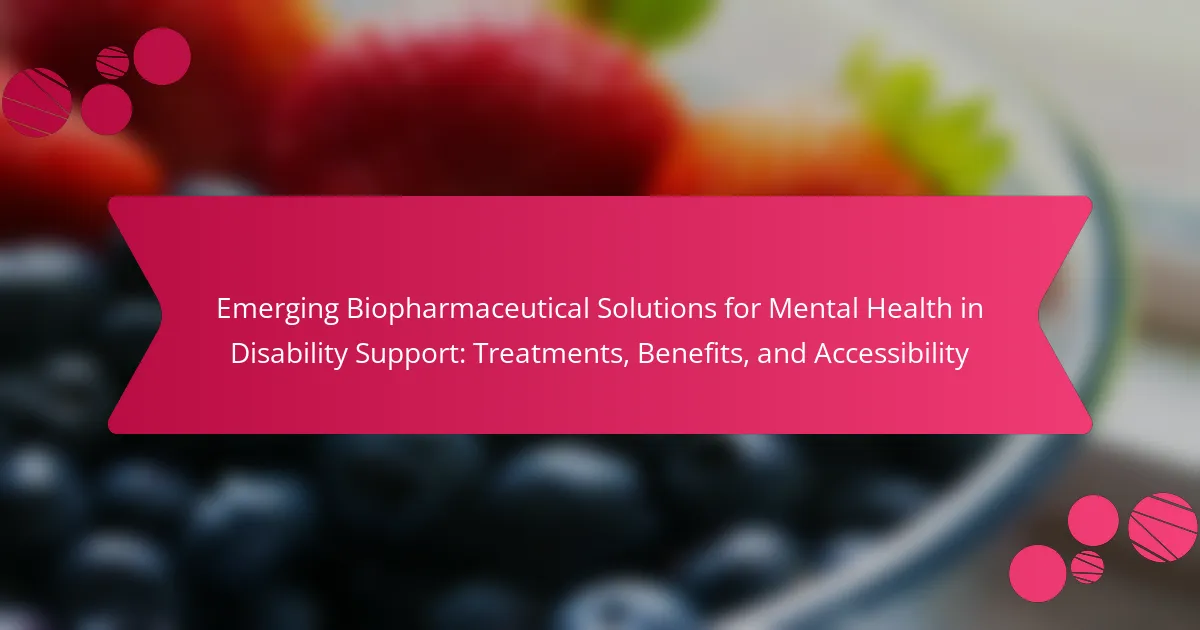Emerging biopharmaceutical solutions for mental health are transforming disability support by enhancing treatment accessibility and effectiveness. This article explores innovative therapies, their benefits for symptom management and quality of life, and the importance of personalized care. It also addresses ethical considerations and the integration of telehealth options to ensure individuals with disabilities receive necessary support.
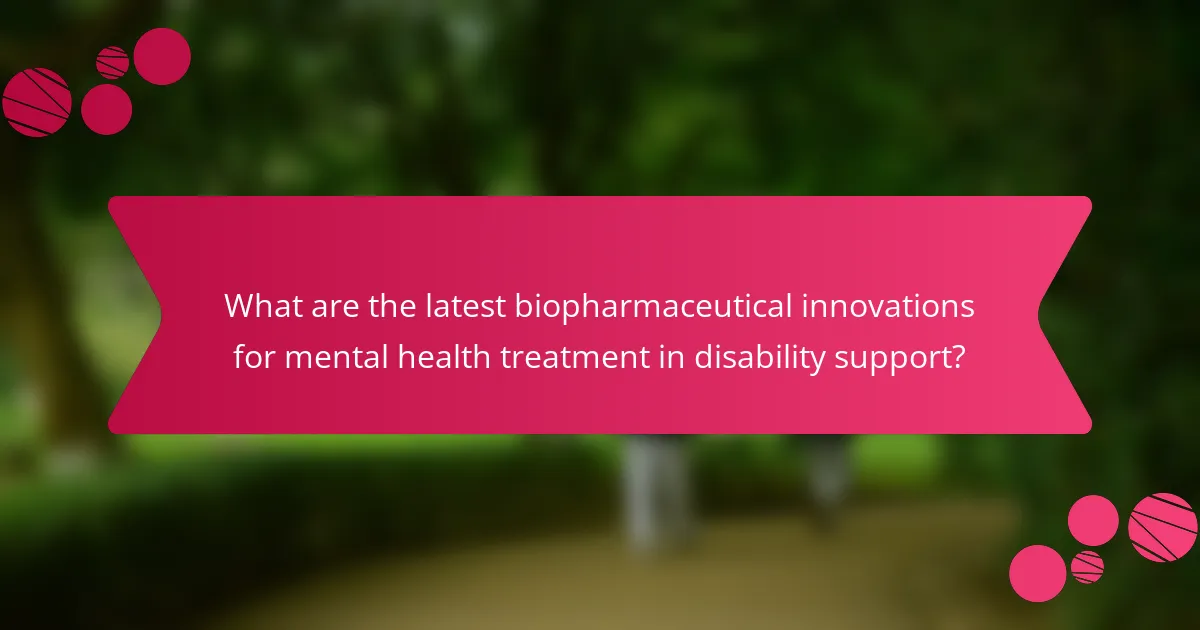
What are the latest biopharmaceutical innovations for mental health treatment in disability support?
Emerging biopharmaceutical solutions for mental health in disability support include innovative treatments that enhance accessibility and effectiveness. Recent advancements focus on personalized medicine, targeting specific mental health conditions with tailored therapies. For example, novel neurostimulation techniques have shown promise in treating depression and anxiety disorders, significantly improving patient outcomes. These innovations not only address symptoms but also reduce side effects associated with traditional medications. As a result, accessibility to these treatments is increasing through telehealth platforms, allowing more individuals to benefit from cutting-edge interventions.
How do these innovations address specific mental health challenges?
Emerging biopharmaceutical solutions effectively address specific mental health challenges by providing targeted treatments and improving accessibility. These innovations focus on conditions like depression and anxiety, offering personalized therapies that enhance patient outcomes.
For example, novel medications can reduce symptoms more rapidly than traditional options, leading to quicker recovery. Additionally, advancements in delivery methods, such as injectable formulations, increase adherence and convenience for patients with disabilities.
The benefits of these solutions extend beyond efficacy; they also promote inclusivity by ensuring that diverse populations have access to necessary treatments. As a result, mental health care becomes more equitable, addressing disparities in support for individuals with disabilities.
Which biopharmaceutical companies are leading the way in this field?
Several biopharmaceutical companies are leading advancements in mental health solutions for disability support. Notable leaders include Eli Lilly, which is pioneering innovative treatments for depression, and Johnson & Johnson, focusing on new therapies for schizophrenia. Other key players are AbbVie, known for its research on anxiety disorders, and AstraZeneca, which is developing medications for bipolar disorder. These companies are enhancing treatment accessibility and improving patient outcomes through cutting-edge research and development initiatives.
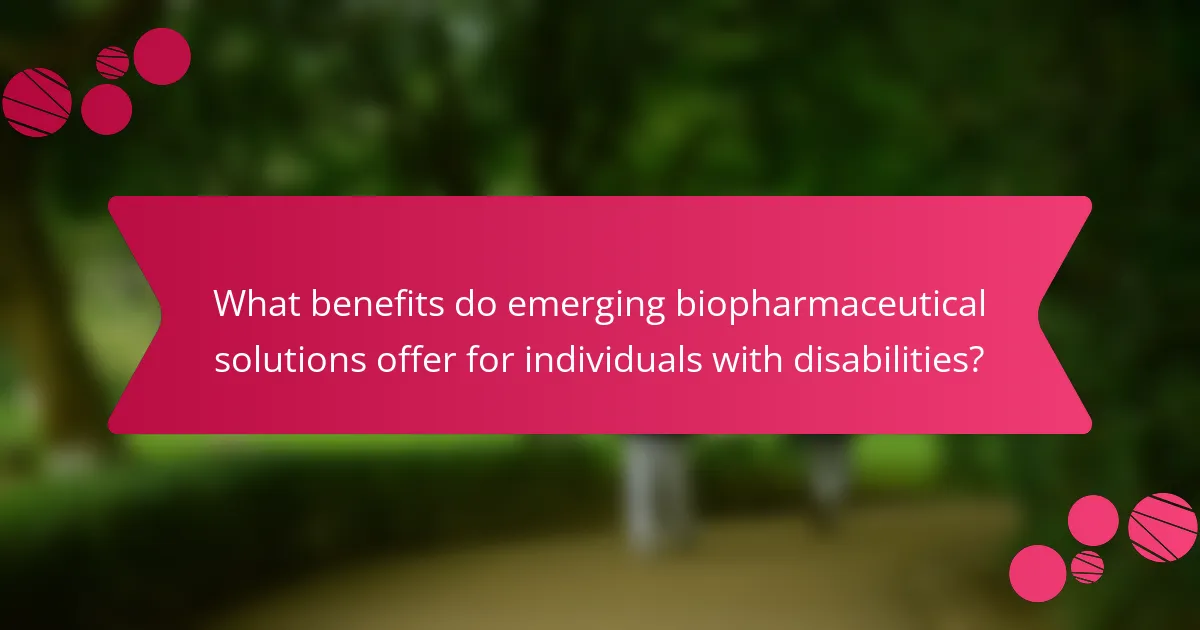
What benefits do emerging biopharmaceutical solutions offer for individuals with disabilities?
Emerging biopharmaceutical solutions offer significant benefits for individuals with disabilities, particularly in mental health support. These treatments enhance symptom management, improve quality of life, and increase accessibility to care.
Innovative therapies, such as personalized medications and advanced delivery systems, target specific mental health conditions. For example, neurostimulation techniques can reduce anxiety and depression symptoms effectively. As a result, individuals experience better emotional regulation and social interaction.
Accessibility is a crucial aspect of these solutions. Many emerging biopharmaceuticals are designed for easy administration, reducing barriers to treatment. This ensures that individuals with disabilities can access necessary care without significant obstacles.
Overall, the integration of emerging biopharmaceutical solutions in disability support systems represents a transformative approach to mental health treatment, fostering independence and well-being.
How do these treatments improve quality of life?
Emerging biopharmaceutical solutions significantly enhance quality of life for individuals with mental health challenges in disability support. These treatments improve symptom management, increase functional capacity, and foster social integration.
For example, innovative therapies can reduce anxiety and depression, leading to better daily functioning. Improved access to these treatments ensures that more individuals receive necessary support, promoting overall well-being.
Research indicates that targeted biopharmaceuticals can lead to a 30% improvement in patient-reported outcomes, emphasizing their effectiveness. Additionally, personalized treatment plans can address unique needs, enhancing engagement and adherence to therapy.
As a result, individuals experience greater independence and improved interpersonal relationships, which are critical for a fulfilling life.
What role do personalized medicine approaches play in enhancing treatment efficacy?
Personalized medicine approaches significantly enhance treatment efficacy by tailoring therapies to individual patient profiles. These strategies consider genetic, environmental, and lifestyle factors, leading to more effective interventions. For instance, pharmacogenomics allows for optimized medication selection based on genetic variations, improving response rates and minimizing adverse effects. Additionally, personalized treatment plans can enhance adherence and overall patient satisfaction, crucial for mental health care in disability support. As a result, emerging biopharmaceutical solutions are increasingly focusing on these personalized approaches to address diverse mental health needs effectively.
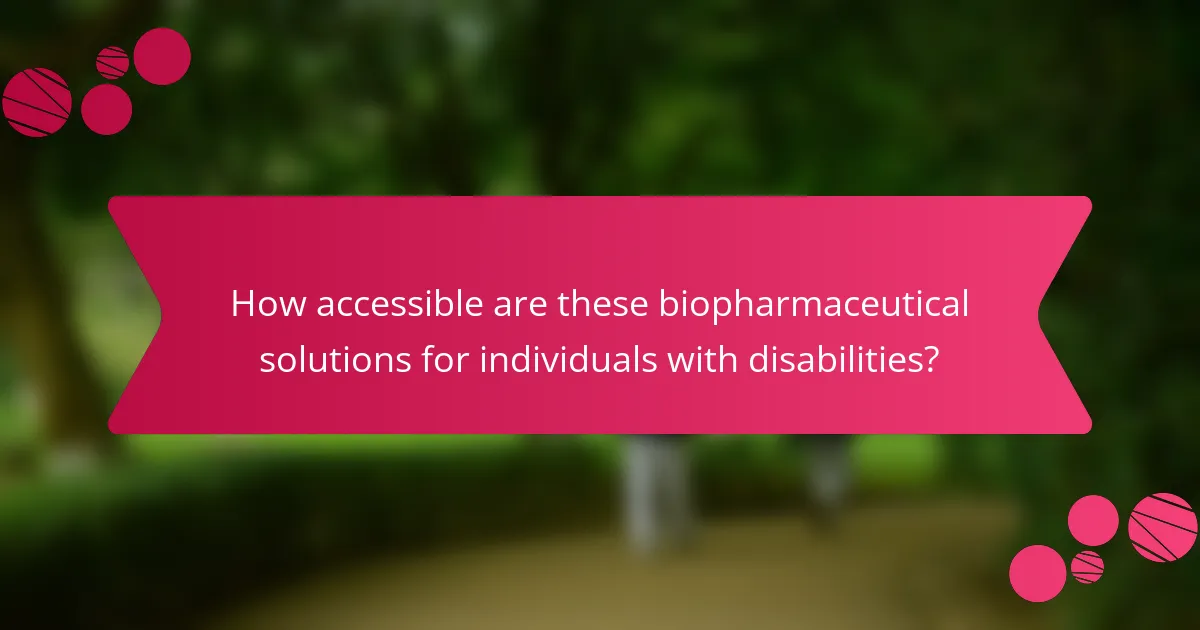
How accessible are these biopharmaceutical solutions for individuals with disabilities?
Emerging biopharmaceutical solutions for mental health are increasingly accessible for individuals with disabilities. Many treatments are designed to be inclusive, considering various needs and preferences.
These solutions often include telehealth options, which enhance accessibility for those with mobility challenges. Additionally, personalized treatment plans cater to unique needs, ensuring effective support.
Financial assistance programs and insurance coverage further improve access, reducing the economic burden on individuals.
As a result, the landscape of mental health support is evolving to be more inclusive, ultimately benefiting individuals with disabilities.
What barriers exist in accessing these treatments?
Barriers to accessing emerging biopharmaceutical solutions for mental health in disability support include cost, availability, and stigma. High treatment costs limit access for many individuals. Geographic disparities create unequal availability, particularly in rural areas. Stigma surrounding mental health treatments also discourages individuals from seeking necessary support.
How do different regions vary in terms of treatment availability?
Treatment availability for emerging biopharmaceutical solutions for mental health varies significantly across regions. Access is often influenced by local regulations, healthcare infrastructure, and funding.
In North America, innovative treatments are more readily available due to robust pharmaceutical research and development. For instance, the U.S. has a higher number of clinical trials and faster approval processes compared to other regions.
In Europe, countries like Germany and France have established frameworks for integrating new biopharmaceuticals into mental health support. However, access can be inconsistent depending on national health policies.
Conversely, in developing regions, treatment options may be limited due to economic constraints and lower investment in healthcare. This disparity affects the availability of cutting-edge therapies, which may not reach those in need.
Overall, regional variations in treatment availability highlight the importance of addressing both systemic and infrastructural challenges to enhance accessibility to mental health solutions.

What are the ethical considerations surrounding biopharmaceutical treatments for mental health?
Ethical considerations surrounding biopharmaceutical treatments for mental health include informed consent, accessibility, and the potential for exploitation. Ensuring patients fully understand treatment implications is crucial. Accessibility remains a challenge, as not all patients can obtain these solutions. Exploitation risks arise when profit motives overshadow patient welfare. Balancing innovation with ethical standards is essential for responsible treatment development.
How is informed consent managed in the context of these treatments?
Informed consent in emerging biopharmaceutical solutions for mental health is managed through clear communication and ethical guidelines. Patients receive comprehensive information about treatment options, potential benefits, risks, and alternatives. This process ensures patients understand their choices, fostering autonomy and trust. Regular assessments and updates during treatment maintain informed consent, adapting to new information or changes in patient condition. This approach enhances patient engagement and aligns with ethical standards in disability support.
What are the implications of long-term use of biopharmaceuticals?
Long-term use of biopharmaceuticals can lead to both positive and negative implications for mental health treatment in disability support. Benefits include sustained symptom management and improved quality of life. However, potential risks involve side effects, dependency, and the need for ongoing monitoring.
Research indicates that consistent use can enhance treatment accessibility, especially for individuals with chronic conditions. Unique attributes of specific biopharmaceuticals may influence their effectiveness and safety profiles. Long-term studies are essential to fully understand these implications and guide best practices in mental health support.
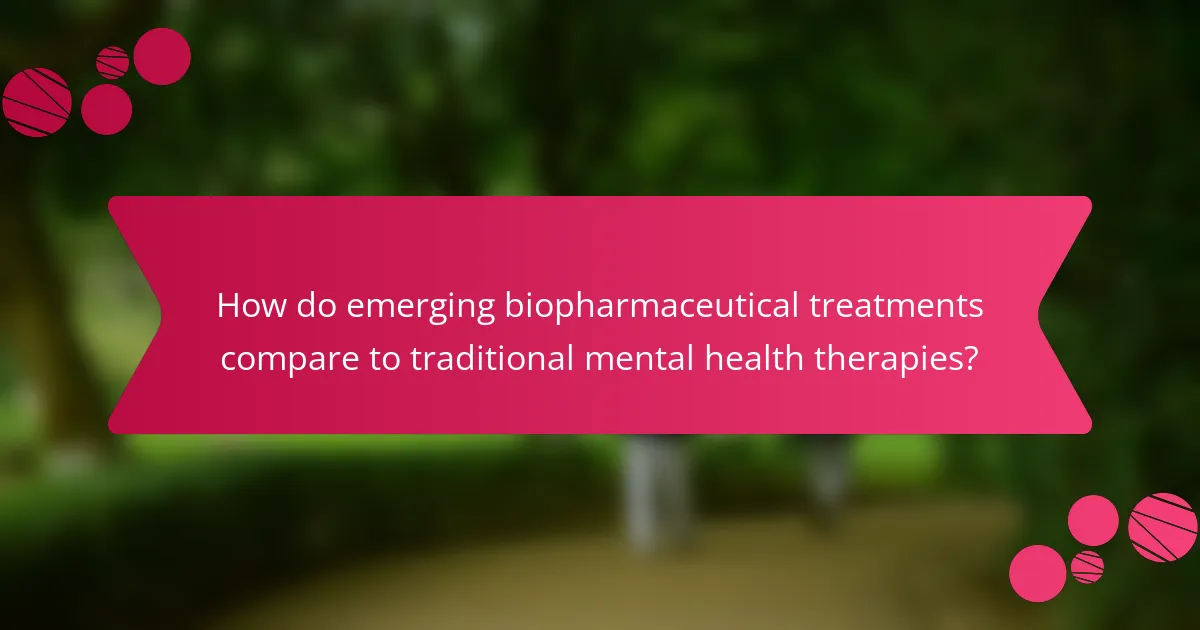
How do emerging biopharmaceutical treatments compare to traditional mental health therapies?
Emerging biopharmaceutical treatments offer innovative approaches compared to traditional mental health therapies. These treatments often target biological underpinnings of mental health conditions, potentially leading to higher efficacy and fewer side effects.
While traditional therapies focus on psychological and behavioral interventions, emerging options include novel medications that can alter neurotransmitter functions or neuroinflammation. For instance, new compounds like psychedelic-assisted therapies demonstrate unique attributes, such as rapid symptom relief for conditions like PTSD and depression.
Accessibility remains a critical issue. Emerging treatments may be cost-prohibitive or require specialized administration, contrasting with the broader availability of traditional therapies. However, as research progresses, the integration of these biopharmaceutical solutions could enhance overall mental health support, especially in disability contexts.
Overall, the comparison reveals that while traditional therapies provide foundational support, emerging biopharmaceuticals present unique opportunities for more effective and targeted mental health care.
What are the key differences in efficacy and side effects?
Emerging biopharmaceutical solutions for mental health show varying efficacy and side effects. Efficacy often depends on the specific treatment, with some demonstrating significant improvements in symptoms, while others may yield minimal effects. Side effects can range from mild to severe, affecting patient adherence.
| Treatment Type | Efficacy Level | Common Side Effects |
|———————–|—————-|——————————–|
| Antidepressants | Moderate | Nausea, weight gain |
| Antipsychotics | High | Drowsiness, metabolic changes |
| Mood Stabilizers | Moderate | Tremors, gastrointestinal issues|
| Novel Therapies | Variable | Fatigue, anxiety |
| Cognitive Enhancers | Emerging | Headaches, insomnia |
These differences highlight the importance of personalized treatment plans in disability support.
Which treatment options are more suitable for specific disabilities?
Emerging biopharmaceutical solutions vary in suitability for specific disabilities. Treatments like antidepressants and antipsychotics address mental health issues in conditions such as depression and schizophrenia.
For anxiety disorders, selective serotonin reuptake inhibitors (SSRIs) and cognitive behavioral therapy (CBT) are effective. Neurostimulation techniques, such as transcranial magnetic stimulation (TMS), offer alternatives for treatment-resistant cases.
Accessibility of these treatments can differ; some require specialized healthcare providers, while others are more widely available through general practitioners. Emerging therapies may improve outcomes by targeting individual needs, enhancing support for diverse disabilities.

What unique attributes distinguish specific biopharmaceutical solutions in mental health?
Unique attributes of biopharmaceutical solutions in mental health include personalized treatment approaches and novel mechanisms of action. These solutions often target specific neurotransmitter systems, providing tailored benefits for individuals with mental health disabilities. For example, some treatments focus on neuroinflammation, a unique attribute that differentiates them from traditional therapies. Additionally, accessibility features, like telehealth integration, enhance patient reach, making these solutions more effective in diverse populations.
How do these unique features enhance treatment outcomes?
Unique features of emerging biopharmaceutical solutions enhance treatment outcomes by improving efficacy, accessibility, and patient engagement. These solutions often leverage advanced technologies, resulting in personalized treatment plans that cater to individual needs. Enhanced delivery methods, such as long-acting injectables, ensure consistent therapeutic levels, reducing the burden of daily medication adherence. Additionally, real-time data monitoring enables healthcare providers to adjust treatments promptly, optimizing patient responses. As a result, these unique attributes lead to improved mental health outcomes and greater quality of life for individuals in disability support.
What rare side effects should patients be aware of?
Patients should be aware of rare side effects from emerging biopharmaceutical solutions for mental health, including severe allergic reactions, unusual mood changes, and neurological symptoms. These effects may vary based on individual responses and specific treatments. Monitoring and reporting any unexpected symptoms to healthcare providers is crucial for safety.

What best practices should be followed when considering biopharmaceutical treatments for mental health?
When considering biopharmaceutical treatments for mental health, prioritize patient-centered care, evidence-based practices, and regulatory compliance. These best practices ensure effective and safe treatment options.
1. Assess individual needs to tailor treatments.
2. Stay updated on clinical trials and emerging therapies.
3. Collaborate with multidisciplinary teams for comprehensive care.
4. Monitor patient outcomes to adjust therapies as needed.
5. Ensure accessibility to treatments for all patients.
How can individuals advocate for their treatment needs effectively?
Individuals can advocate for their treatment needs by being informed, assertive, and proactive. Understanding emerging biopharmaceutical solutions enhances their ability to communicate effectively with healthcare providers. They should prepare specific questions regarding treatments, benefits, and accessibility. Documenting symptoms and treatment responses can support their case. Engaging in support groups can provide additional insights and resources. Utilizing available advocacy resources, such as mental health organizations, can also empower individuals in their journey.
What common mistakes should be avoided when starting a new treatment?
Avoiding common mistakes when starting a new treatment can enhance the effectiveness of emerging biopharmaceutical solutions for mental health. Key errors include neglecting to consult healthcare professionals, overlooking individual health conditions, and failing to consider treatment accessibility. Misunderstanding the treatment timeline and not monitoring progress can also hinder success. Each of these mistakes can impact the overall benefits derived from innovative treatments.
